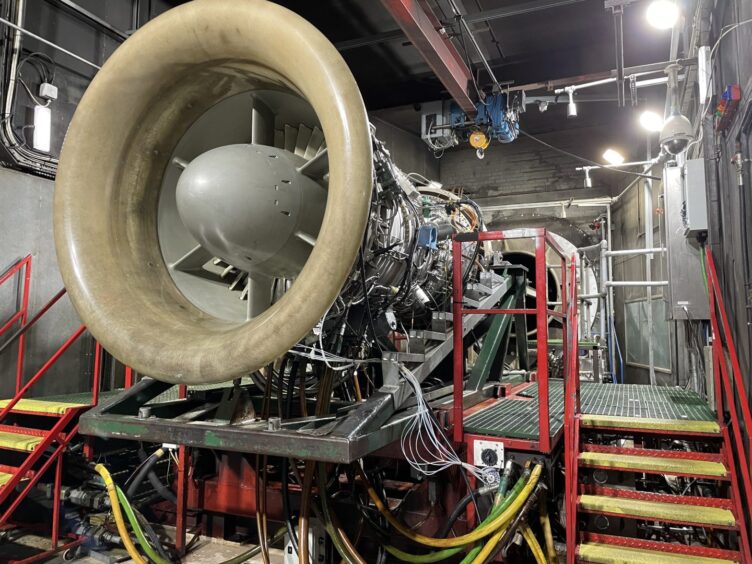
A gas turbine used by the offshore energy industry for decades has proved it can be retrofitted to run on methanol, reducing harmful emissions by 80%.
The demonstration in Aberdeen running an SGT-A35 gas turbine on cleaner fuel was hailed as a “key milestone” and “great result” for a project aimed at reducing North Sea oil and gas industry pollution.
The experiment was part of an alternative fuel for gas turbines project, one of seven under the Net Zero Technology Centre’s (NZTC) net zero technology transition programme (NZTTP). NZTTP has been backed with £16.5 million from the Scottish Government’s energy transition fund alongside match funding from industry.
Methanol is produced from various feedstock. These include lower-carbon intensities using carbon capture and storage (CCS), known as blue methanol; biogenic sources known as bio-methanol; and green hydrogen and captured CO2, or e-methanol. Widely available conventional methanol produced from natural gas can result in a 10% reduction in CO2 emissions today compared to traditional liquid fuels. Renewable methanol can cut CO2 emissions by up to 95%.
Methanol, in all its forms, also reduces other emissions including NOx, PM, SO2 and smoke. The demonstration test showed a decrease in NOx of up to 80%.
Turbine manufacturer Siemens Energy (F.ENR) and NZTC carried out the demonstration at the specialist gas overhaul RWG facility in Dyce.
Turning the turbine for another 50 years
The SGT-A35 gas turbine was introduced to the market in the 1970s and can now produce up to 38MW of power per unit. Used both offshore and onshore for power generation and mechanical drive, there are 800-plus turbines worldwide which have accumulated over 46 million operating hours, Siemens said.
Siemens Energy used simple 3D printing techniques to manufacture the new components required for methanol fuel conversion. The partners said this proved that existing gas turbines can be retrofitted to use methanol with minor modifications, proving the feasibility of green methanol for decarbonising current infrastructure.
This latest feat builds on NZTC and Siemens Energy’s 2023 success, demonstrating a less powerful SGT-A20 turbine running on bio-methanol.
Charlie Booth project manager at NZTC said: “This is a key milestone and great result for the alternative fuel gas turbine project, which was only possible through outstanding collaboration with government and industry.
“Methanol’s unique properties make it an exceptional choice as a retrofittable, low-carbon alternative fuel and it is great that we are able to showcase the opportunity that exists in adapting existing infrastructure to meet our net zero targets and energy needs. I’d like to express my thanks to all the project participants that made this possible.
Darren Davidson, vice president Siemens Energy UK&I, said: “This is another significant step as we transition to a clean energy future in the North Sea.
“The turbine’s successful operation on methanol marks a pivotal moment in our journey towards sustainable energy. This achievement not only highlights the versatility and adaptability of our turbines but also underscores the practical steps we can take to reduce CO2 emissions in difficult to decarbonise industries. I’m proud of our team’s role, working in partnership, to achieve this.”
Tim Cornelius, the managing director corporate development at Proman, which supplied the methanol, said: “The use of methanol as a cleaner alternative fuel for power generation is growing, driven by its efficient combustion, ease of last mile distribution and global availability. It is a versatile and affordable solution to meet emissions reduction targets, significantly reducing airborne pollutants.as proven by these latest test results.”
RWG managing director Mark Forsyth said the firm was “thrilled to have played a part in this demonstration”.

 © Supplied by NZTC
© Supplied by NZTC
